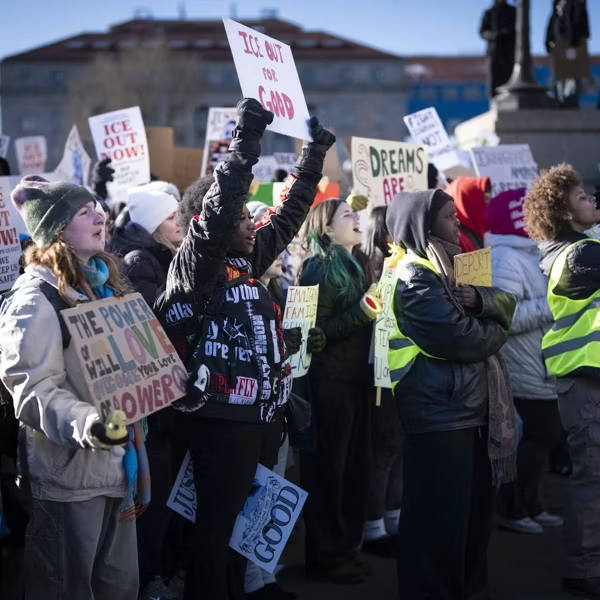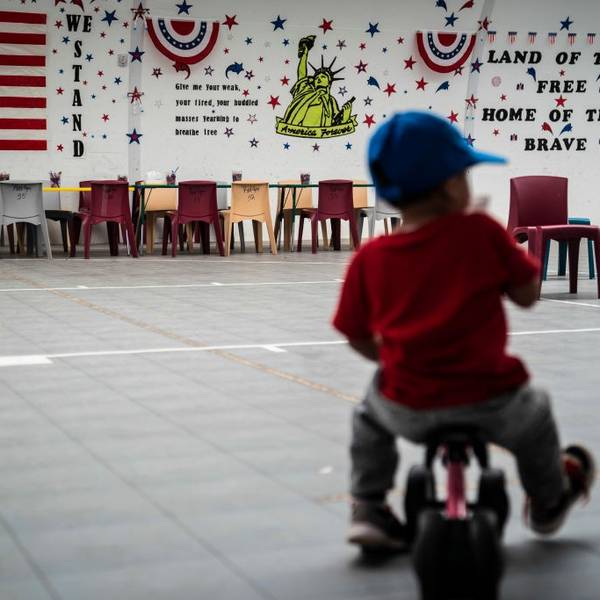After a campaign built on xenophobic remarks, a pledge to construct a massive wall across the southern border, and promises to form "a deportation force" to rid the nation of millions of undocumented immigrants, it's not surprising the psychological impact of Donald Trump's rhetoric would be most sharply felt among those living within those communities.
"People worry their families will be broken up, that parents will be deported and children will end up in foster care, on a scale that we've never seen before. The feeling out there is one of great fear." --Marielena Hincapie, National Immigration Law Center
And now, with the reality setting in that Trump will soon by the President of the United States, the Guardian reports Friday how pediatricians serving in communities with large populations of undocumented immigrants are seeing a spike in anxiety-related physical illnesses, most notably among children expressing worry that they, their parents, or other loved ones will soon be arrested or deported.
As the Guardian's Andrew Gumbel reports:
One little boy in North Carolina has been suffering crippling stomach aches in class because he's afraid he might return home to find his parents gone. In California, many families are reporting that their children are leaving school in tears because their classmates have told them they are going to be thrown out of the country.
Children are showing up in emergency rooms alone because their parents are afraid of being picked up by Immigration and Customs Enforcement if they show their faces. Even American-born children are suffering - one boy in the south-east asked a doctor for Prozac because he was worried about his undocumented friend.
"It's as though a volcano erupted. It's been awful," said Mimi Lind, director of behavioral health at the Venice Family Clinic, one of the largest providers of healthcare to low-income families in southern California. "People who don't have a history of anxiety and depression are coming forward with symptoms they've never had before. And people who had those symptoms already are getting much worse."
It's too soon to put precise figures on the wave of Trump-related anxiety, but health professionals and immigrant rights groups say it is unmistakable. "People worry their families will be broken up, that parents will be deported and children will end up in foster care, on a scale that we've never seen before. The feeling out there is one of great fear," said Marielena Hincapie of the National Immigration Law Center.
In addition to his own comments, Trumps' nomination of Sen. Jeff Sessions (R-AL), an anti-immigration hardliner, to be the next Attorney General has only increased those fears. Beyond the worries about what might happen to older family members, many teenagers and young adults from immigrant families--namely those brought to the US as minors and known as DREAMers--are also facing uncertainty about what the future holds for them.
Feeling somewhat protected under the Deferred Action for Childhood Arrivals (DACA)--an executive order issued by President Obama--many of those young people are increasingly unsure of what will happen when the Republicans take full control of Congress and Trump arrives in the White House.
Twenty-year-old Josue De Luna, a student living in New Mexico, told the Albuquerque Journal that whatever happens after Trump's inauguration, he and other immigration rights advocates are bracing for a fight.
"We are concerned about our future, but we are definitely here to stay," De Luna told the Journal. "This is our home. It's going to be four years of intense fighting and trying to protect all the progress the immigrant movement has accomplished."
But as some prepare to fight back, those working in immigrant and low-income communities say it is becoming increasingly hard to assure anxious residents that everything will be okay.
Lind, the behavioral health specialist who spoke with the Guardian, says that the anticipation of what Trump and the Republicans might do is "the most anxiety-provoking" aspect of the current moment.
"No one can say anything," she said. "We have no way of allaying people's anxiety with concrete facts."



